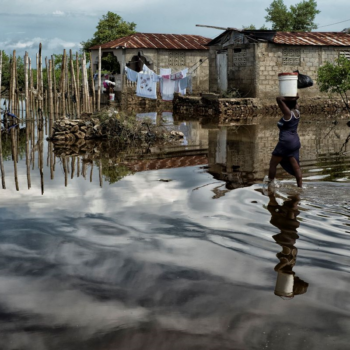At today’s UN Global Platform on Disaster Risk Reduction in Geneva, E3G and UNDRR report brings research on disaster risk reduction and sustainable finance together for first time.
Research finds Europe can reduce disaster risk and increase climate resilience through reforms to financial system.
Story
The scale of financial flows and investments is massive, with European assets under management at €147 billion5. Most investments still fail to take disaster and climate-related risk into account. The total reported economic losses caused by weather and climate related extremes in European Member States over the 1980–2017 period amounted to almost half a trillion euros and is expected to continue to increase over time6. The question of who in society is protected, and who pays for this protection, has never been more important.
At today’s UN meeting governments from around the world will try to integrate their approaches to disaster, climate and sustainability development. The new report, bringing together insights from the fields of Disaster Risk Reduction and Sustainable Finance, finds that the European Commission’s Sustainable Finance Action Plan could be strengthened to improve Europe’s resilience to disaster and climate change. The study identifies eleven ‘areas for exploration’ within Europe7, many of which can also be addressed at international level.
Quote
Kate Levick, Sustainable Finance Program Leader of E3G said:
The effects of climate change are already with us, as we have seen from multiple extreme weather events in the last months. The next European Parliament and Commission will have a unique opportunity to put disaster risk reduction, climate change adaptation and resilience at the heart of the financial system with its next wave of reforms.
Europe’s Sustainable Finance Action Plan is a world-leading policy framework. However the Plan’s high-level support of disaster risk reduction and climate change adaptation as well as the current legislative processes have mainly focused on other topics. We see many opportunities to use finance policy to protect European citizens from the impacts of these risks, and for Europe to act as a leader on this issue internationally.
ENDS
Notes to Editors
- E3G is an independent climate change think tank accelerating the transition to a climate neutral safe world. E3G specialises in climate diplomacy, climate risk, energy policy and climate finance.
- In 2018 for the third year running, E3G was ranked the fifth most globally influential environmental think tank, by the Global Go To Think Tank Index.
- The report, Opportunities to integrate disaster risk reduction and climate resilience into sustainable finance, can be read here.
- The sixth Session of the Global Platform for Disaster Risk Reduction (GP2019) takes place in Geneva, Switzerland from 13 to 17 May, 2019, convened and organized by the UN Office for Disaster Risk Reduction (UNDRR) and hosted by the Government of Switzerland.
- Source: EFAMA 10th Asset Management Report, European Fund and Asset Management Association, September 2018
- Source: Economic losses from climate-related extremes in Europe, European Environment Agency, April 2019
- Recommendations include the following:
- National and local authorities could create disaster risk and climate adaptation strategies which link to national investment plans and priorities.
- European companies can also create disaster risk and climate adaptation strategies, and could share their information with governments to inform national risk assessments.
- Disaster risk and climate adaptation strategies could be assessed against data-driven future climate change scenarios.
- Europe’s sustainable finance taxonomy could include not only “sustainable” but also “unsustainable” economic activities, which would include those that are not resilient to disaster/climate change risk.
- Resilience could become a formal baseline requirement for all European finance instruments, using a “Think Resilience” approach.
- European institutions could take measures to define high-quality resilient infrastructure.
- Resilient infrastructure measures could be embedded in the next European budget, from 2021-2027.
- Credit ratings agencies could be required to take into account sustainability criteria that include resilience to disasters and climate change.
- Institutional investors and asset managers could be required to take resilience into account when making investment decisions. Finance Ministers could take the same approach to national finance decisions, working together within ECOFIN.
- European institutions could work to better understand the impact that integrating environmental risks into the financial system may have on vulnerable communities who are exposed to disaster and/or climate risk.
- Financial and non-financial companies could be required to disclose climate-related financial risk to their investors.


